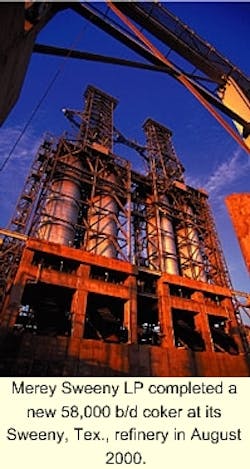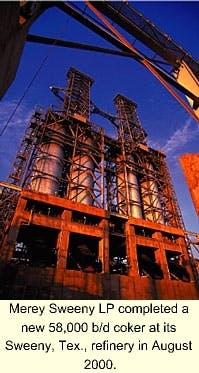Refinery completes revamp to accommodate Venezuelan crude
With the help of Bechtel Corp., Phillips Petroleum Co. and Petroleos de Venezuela SA (Pdvsa) completed a revamp of their Sweeny, Tex., refinery to process a heavier crude.
The Merey Sweeney project installed a new 110,000-b/d vacuum distillation unit and 58,000-b/d delayed coking unit in the refinery.
Bechtel, the engineering, procurement, and construction (EPC) contractor on the project, believes it set a world record in the time to design and build a coker of this size and complexity.
The new units give the refinery the ability to process Merey 16, a blend of heavy crude oil found in eastern Venezuela. Besides more gasoline and heating oil production capacity, the new project gives the refinery the ability to produce fuel-grade petroleum coke, which it can sell as an ingredient for cement or a fuel for electric generation.
Coker construction
Bechtel's alliance with Conoco Inc., called the Conoco-Bechtel Coker Alliance, allows it to market Conoco's coking technology and its EPC abilities in one package.
Merey Sweeney is Bechtel's first lump-sum coker project to employ the skills of the company's Coking Center of Excellence. The team consists of Bechtel coker design and operations specialists and Conoco engineers.
The Center of Excellence and Conoco are also working on coker designs for ExxonMobil, Hovensa, Marathon Ashland, Suncor, and Middle East Oil Refinery.
The four-drum coker has a dewatering pit and bridge crane. It was designed and built in 25 months, faster than any other coker of such size of which Bechtel is aware.
Bechtel began engineering and procurement work in July 1998. Construction began in July 1999. The project was completed in August 2000.
The scope of the project, said Jim Cummins, business manager and deputy project manager, was a challenge in itself. It required 24,000 cu m of concrete, 4,000 tons of structural steel, 250 pieces of mechanical and electrical equipment, 61,000 m of pipe, 1,700 instruments, and 305,000 m of cable.
The coke drums, particularly, were cumbersome. Each drum was 39 m long, 9 m in diameter, and 476,000 kg. It took 2 days to move each of the four drums a distance of 8 km.
To get heavy materials to the site, Bechtel built new on-site access roads, improved existing county roads, and relocated phone, gas, and electric utilities along the route.
Imported materials were shipped from the Freeport, Tex., port on the Gulf of Mexico. Bechtel arranged and negotiated approvals for barge transport up the San Bernard River.

